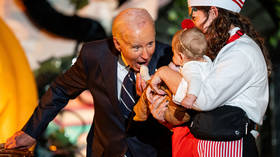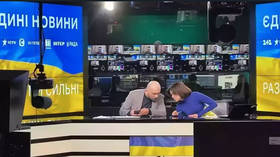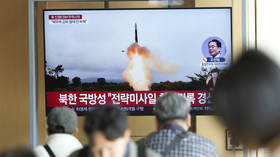Syrian villagers describe massacre by militant group spared from UN terror blacklist (EXCLUSIVE)
Eyewitnesses from Zara, an Alawite Syrian village, have revealed brutal killings and kidnappings at the hands of Ahrar al-Sham and Al-Nusra fighters to RT. This week, Western powers blocked the militant group’s inclusion on the UN terrorist list.
Ahrar al-Sham, which espouses a strict Salafist form of Sunni Islam, reportedly fought alongside the Al-Nusra Front, an internationally recognized terrorist organization, which is not protected by the US and Russia-mediated ceasefire in Syria.
The group admitted responsibility for the raid but claimed that it had not mistreated those who did not resist.
“Civilians were not targeted. On the contrary factions made great effort to spare civilians and deal with prisoners humanely,” said an Ahrar al-Sham spokesman in a statement, cited by Reuters.
However, residents of the village who spoke with RT Arabic painted a different picture of events, describing the raid on the settlement as a war crime.
“They killed elderly people, took children and women as captives. We want to find out what happened to them afterwards. We know nothing about them,” Abdou Khalifa, a villager, who himself sustained wounds, told the channel.
AlQaeda & its rebels allies attacked & ethnically cleansed Alawite civilians in AlZara village in suburbs of Homs pic.twitter.com/t8J2RHzRiA
— Bassem (@BBassem7) May 12, 2016
“Strangers came to our village. Most of them were foreigners, we understood that they weren't from Syria from the way they looked. They attacked our village, many were killed. My brother is among the dead, his children were wounded. They killed entire families,” said Ahmad Muhammad al Qasem.
“They perpetrated a massacre,” said another villager, Munzer Qasem. “I heard of two or three entire families killed. Abu Naval’s family was killed. He was an old man and was killed together with his daughters. They were slaughtered in their own house.”
Villagers said that “scores” of people were either killed or taken hostage by the Islamist raiders. The accounts tallied closely with those shown by Syrian state television and emerging on social media.
One of the gruesome images that emerged on social media showed Ahrar al-Sham fighters standing above several bloodied corpses of women. The group did not deny the veracity of the photograph, but insisted that the women bore arms, and had been killed in combat.
US refuses to blame Ahrar al-Sham
The incident comes as something of an embarrassment to Washington, after it defeated Russia’s long-standing proposal to designate the group, along with another militant movement, Jaish al-Islam, as terrorist organizations, for their radical ideology and co-operation with Al-Qaeda inspired terrorist movements.
If Russia’s initiative had been approved by the UN Security Council, the two groups would have become legitimate targets for Syrian, Russian and Western airstrikes, and would lose their place on the High Negotiation Committee, the Saudi-backed body that represents part of the fractured Syrian opposition during international peace talks.
But London, Paris, Washington and Kiev defeated Russia’s proposal, with a US mission spokesperson saying that designating “groups that are parties to the cessation of hostilities could have damaging consequences to the cessation just as we are trying to de-escalate the situation on the ground.”
The US State Department admitted that the incidents during the capture of Zara were “unacceptable and incomprehensible” but refused to pin the blame on Ahrar al-Sham or clearly condemn the group’s cooperation with Al-Nusra.
Kirby asked about Al-Zara,Ahrar's role & it's alliance with Nusra. Read his answer. I challenge u not to puke #Syriapic.twitter.com/LbC5usQmJv
— Walid (@walid970721) May 13, 2016
“Ashar al-Islam is not… a designated foreign terrorist organization and therefore is a party to the cessation. And our expectation of them is the same expectation we have for everybody else who is a party to the cessation, that they will observe it, that they will abide by it,” said a State Department spokesman during Friday’s press briefing in Washington. “And we’ve said all along that we’ve seen some comingling, and we have seen even to some degree some troubling cooperation between certain opposition groups and al-Nusrah. Again, I’m not specifically talking about this attack.”
The spokesman also admitted that the State Department had not threatened the group with potential blacklisting for their cooperation with a designated terror organization, but reiterated that the US had made its expectations “very clear.”
“Those that are part of the HNC and the armed opposition, we have made very clear our expectations for their behavior and conduct with respect to the cessation of hostilities,” John Kirby said.
Gregory R. Copley from the International Strategic Studies Association believes that the reason Washington refuses to condemn or blacklist Ahrar Al-Sham is that the US is short of so-called moderate opposition allies in Syria,
“The only reason for the US not to brand them as a terrorist group is to keep them as an ally in the fight against President Assad, because the US doesn’t have many allies on the ground with any strength, so they are relying on these groups which have strong relationships with Saudi Arabia and Turkey as well,” Copley told RT.
Tacit US support for Ahrar Al-Sham, at a time of emerging reports of atrocities potentially committed by the group, blemishes Washington’s reputation, he said. The downside of such rhetoric is that “the US does look bad as a result,” Copley added. “You can’t have it both ways.”











